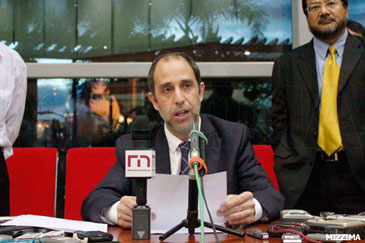Chiang Mai (Mizzima) – The UN Special Rapporteur on human rights in Burma has called for concrete action from the Burmese government in dealing with human rights abuses in the country’s ethnic states.
 In a report submitted to the UN General Assembly on Wednesday, Tomas Ojea Quintana noted that while he “welcomed the government’s stated commitments to reform and the priorities set out by President Thein Sein,” the Argentinean lawyer reiterated “that these commitments must be translated into concrete action.”
In a report submitted to the UN General Assembly on Wednesday, Tomas Ojea Quintana noted that while he “welcomed the government’s stated commitments to reform and the priorities set out by President Thein Sein,” the Argentinean lawyer reiterated “that these commitments must be translated into concrete action.”
Describing Burma’s new government as “nominally civilian,” Quintana’s report acknowledged that at present in the country “there is an emergence of different actors and parties engaging in the political process.”
His report however claimed that many actors including ethnic minorities continued to be excluded from this process. Referring to Burma’s new national, state and regional parliaments now in operation, Quintana concluded: “These venues alone are therefore not sufficient for resolving the situation of ethnic minorities.”
Quintana mentioned the conflicts under way in the north and eastern part of Burma and said the “ongoing tensions in ethnic border areas and armed conflict with some armed ethnic groups, particularly in Kachin, Shan and Kayin States, continue to engender serious human rights violations, including attacks against civilian populations, extrajudicial killings, sexual violence, arbitrary arrest and detention, internal displacement, land confiscations, the recruitment of child soldiers and forced labour and portering.”
Quintana’s rather bleak assessment of the situation facing ethnic minorities in Burma stands in sharp contrast with information contained in UN Secretary-General Ban Ki-moon’s report on Burma submitted last month to the UN General Assembly.
Human Rights activists from Burma’s ethnic minorities have taken issue with what they say was Ban’s deliberate downplaying of the level of violence in large parts of Burma where the army is fighting armed ethnic groups.
At press conference two weeks ago, representatives of the Kachin Women’s Association of Thailand said the number of number of rapes, extrajudicial killings and forced relations committed by the Burmese army during its four month offensive against the Kachin Independence Organization (KIO) is proof that a full scale war is going in Burma’s north. They criticized Ban for concluding in his report that the conflict between the KIO and the Burmese army merely ran the “risk of an escalation into large-scale violence and open fighting for the first time since the signing of a cease-fire agreement in 1994.”
UN aid offer for displaced Kachin turned down by Burmese government
In contrast to Ban’s assessment of the Kachin situation, Quintana estimated that recent fighting had resulted in more than 15,000 internal displaced people being confined to a “remote mountainous area” of northern Burma along the Chinese border. Quintana described their situation as “perilous” and added there was “little aid available.”
According to Quintana, the UN informed the Burmese authorities that it was willing to help these internally displaced people but this attempt appears to have been declined by Thein Sein’s government.
Quintana wrote: “The United Nations approached the Government, offering assistance to all those in need. According to reliable sources, the Government’s position is that assistance is currently provided at the local level, and when needed they will seek further assistance from relevant partners.”
When contacted by Mizzima to comment on the current situation in the Kachin conflict area, Martin Nesirky chief spokesperson for the UN secretary-general responded in an email sent Wednesday: “The response last month still applies, and we do not have anything further at this stage.”



